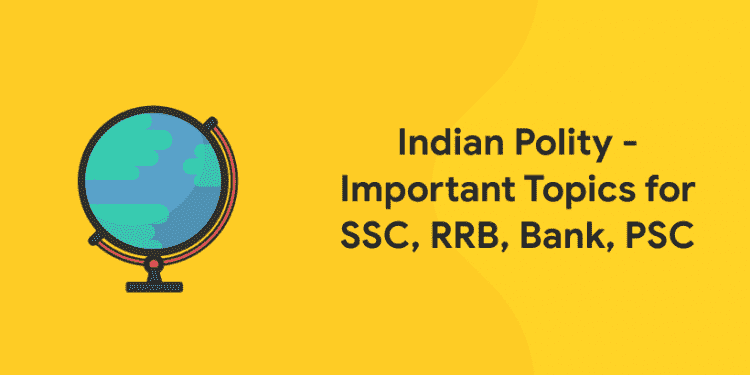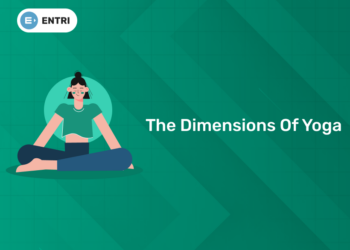Table of Contents
Indian Polity is one of the most important subjects from which questions appear in the SSC, RRB, Bank, PSC, and other government exams. In this article, we will mainly focus on Indian Polity – Important Topics for SSC, RRB, Bank, PSC. We will also discuss how one should study Polity to score well in the above-said exams.
Download Entri App and attempt Mock Tests of various Exams!!!
The term Politics is taken from the Greek term ‘Polis’ (meaning- city/state). Later scholars defined it as a scientific study of problems regarding the state and the government. Aristotle is considered the ‘Father of political science’ in the west. In India, the first political thinker is considered to be the Manu. The growth of political philosophy in India can later be seen in Kautilya’s ‘Arthashasthra’. Read further to learn more about this subject. Indian polity notes PDF download links are provided below for easy access.
Indian Polity – Important Topics for SSC, RRB, Bank, PSC
Indian Polity:
Indian Polity is an integral part of the competitive examinations whether its SSC exams or Railway exams. It consists of the polity related topics of the country responsible for maintaining the rules and regulations of the country. Indian Polity generally contains topics such as the Fundamental rights & duties, constitution, Union & State executive, etc. Indians must know about the governance of Indian democracy in detail. The fundamentals of a country are related to its polity. Read this article to gain knowledge about the important topics of Indian polity underlying the foundation of a country. This post is a compilation of Indian polity notes to build your concepts and learn about Indian Polity and governance topics.
What is the Indian Polity?
The study of the functioning of the Indian government and its system is called Indian Polity. It highlights the regulatory bodies responsible for maintaining the administration of the country. It covers a vast variety of topics including the historical topics forming the basis of the present government. While serving as a government servant, one must be well versed in governance and public administration.
Important Topics
1: Who was the first woman President of India?
In this portion, we have listed out the topics and sub-topics that form the basis of the Indian Polity.
Indian Constitution
The constitution was adopted and given to the people of India by our constituent assembly on November 26 1949. It came into force on January 26 1950. When first implemented it had 22 parts, 395 articles and schedules. But it changed due to many constitutional amendments that took place over the years. Given below are the most important parts of the Indian constitution for SSC exam preparation.
- The making of the Constitution of India
- Laws before the making of the Indian constitution
- Human rights charter
- Writs
- The preamble of the Constitution
- Making of the constituent assembly
- The Constituent Assembly of India
- Basic Structure (Doctrine) of the Constitution
- Features of the Indian Constitution
- Constitution of India: features taken from other countries
- Parliamentary System in India
- Citizenship
- Directive Principles of State Policy
- Political Parties in India
- Elections in India
- Schedules in the Constitution of India
- Scheduled and Tribal Areas in India
- Co-operative Societies
- Emergency Provisions in the Indian Constitution
- Electoral Reforms in India
- Panchayati Raj Systems in India
- List of Important Articles of the Indian Constitution
- Reorganization of Indian states
- Important constitutional amendments
- Right to Information Act 2005
- Important terms in Indian polity and constitution
Fundamental Rights & Fundamental Duties
- Fundamental Rights
- Fundamental Duties of the Citizens of India
Download Entri App and attempt Free Mock Tests of various Government Exams!!!
Separation of powers in Indian politics
The different organs of Indian political organisation are
- The legislature
- The executive
- The judiciary
- Press/media
- Public opinion/exit poll
Among these, the legislature, executive and judiciary are considered to be the three parts of the government.
Legislature
The Indian legislature comprises both the houses of the parliament: the Lok sabha (house of the people) and the Rajya Sabha (Council of states). Similarly, the state legislature is divided into legislative assembly and legislative council.
Executive
The president is the head of the state while the prime minister is the head of the government. They are supported in their functions by the council of ministers that forms the cabinet ministry. At the state level, the governor is the head of the executive and runs the office with help of a council of ministers led by the Chief Minister.
Judiciary
The Supreme Court of India is the most important institution of the Indian legal system. In states, it is the high court and the subordinate courts that come under them.
Given below is a table of topics important for the preparation of Indian polity notes for SSC, TNPSC, KPSC, RRB etc
Parliament & Indian Judiciary
- Parliament of India
- Parliamentary Committees
- Budget in Parliament
- Amendment of the Constitution
- Anti-Defection Law
- Supreme Court of India
- High Courts in India
- Subordinate Courts in India
- Central Administrative Tribunal
- Important parliamentary terms
- Local self government
- Ombudsman
- List of national symbols of India
- Important Committees and commissions
Union & State Executive
- Office of the President of India: Instructions to electors
- List of Vice-Presidents in India and their Term of Office
- Rashtrapati Bhavan
- Prime Minister of India
- Cabinet Committees
- Union-State Relations / Centre-State Relations
- Governor in Indian Constitution
- Chief Minister in India
- The Union
- States and Union Territories
Get Free Mock Tests for various Competitive Exams !!!
Constitutional & Non-Constitutional Bodies
- Election Commission of India
- Union Public Service Commission
- State Public Service Commission
- National Finance Commission
- State Finance Commission
- Comptroller and Auditor General of India
- Attorney General of India
- Planning Commission of India
- National Institution for Transforming India (NITI) Aayog
- Central Vigilance Commission
- Central Bureau of Investigation
Note for Indian Polity Exam 2022
- Constitution of India
- The preamble to the constitution
- What are the salient features of our Constitution?
- Human rights charter
- Difference between State executive and State Legislature assembly
- Indian Parliament
- Local government – Meaning, Types, Example
- Judiciary in India 2022
- Right to information Act 2005
- CAG of India 2022- List, Duties, Functions
How to Study Polity?
Indian Polity forms a major portion in the General Awareness section. Here are some ways to understand the Indian Polity:
- Read the articles in the constitution thoroughly. Try to memorize them regularly.
- Repeated reading and revision will be helpful in this process. The more times you read the more you would learn.
- Prepare short notes by highlighting the important topics and relate them to a current issue.
- One should aim at extracting the important information according to the syllabus.
- Refer to the previous year’s papers and start solving question papers.
Get Free Mock Tests for various Competitive Exams !!!
All the above-discussed topics of Indian polity are favoured by the experts who prepare question papers for competitive exams like SSC, TNPC, KPSC, RRB etc. Download the Entri app to learn more about the specifications of competitive exams












